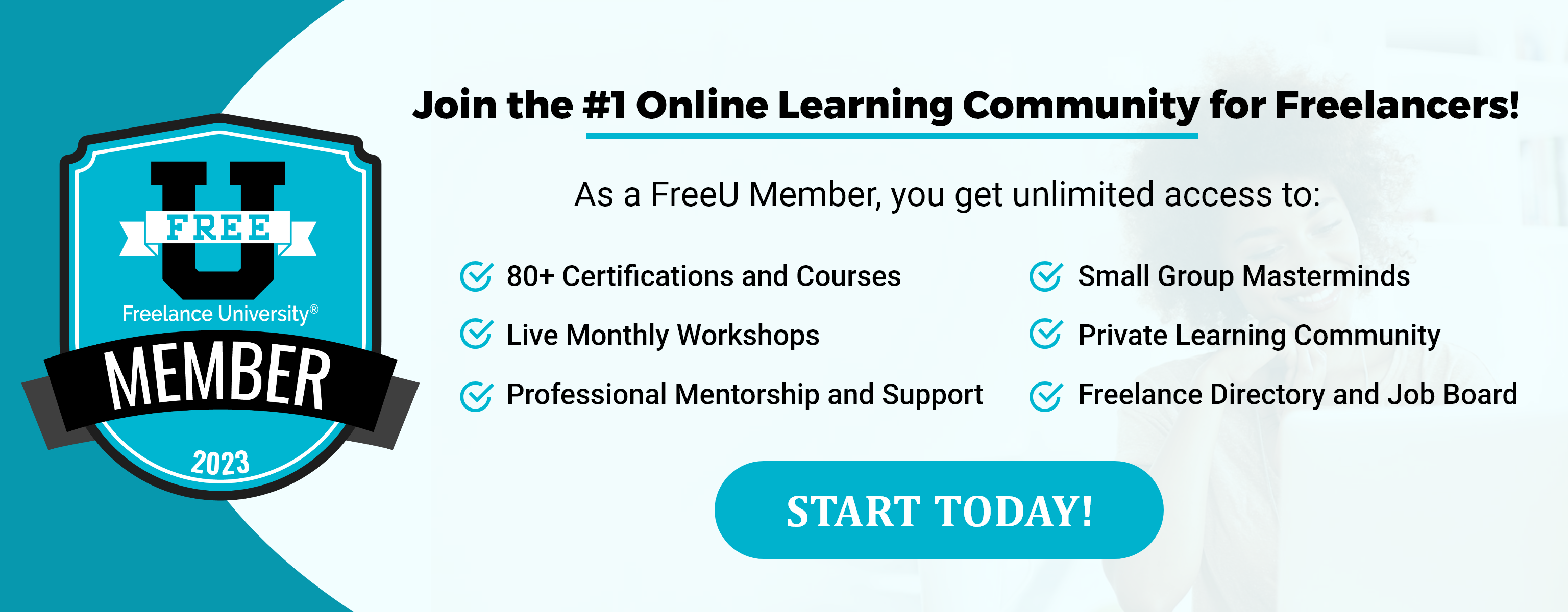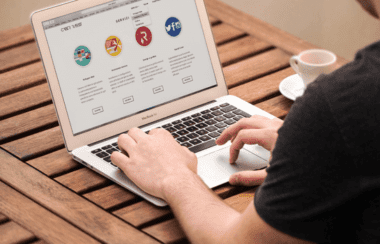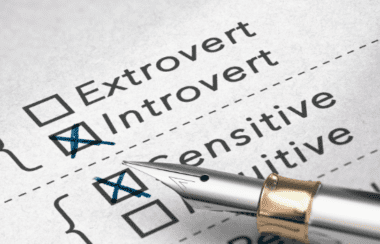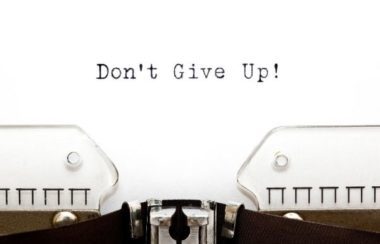Your Self-Care Plan for 2023
By Jena Kroeker

What comes to mind when you hear the phrase “self-care plan”? I usually think of the times when I didn’t have a plan. In a previous blog post, “How to Avoid Burnout in Your Freelance Business,” we discuss strategies to prevent you from losing energy, productivity, and passion for the work you love. I envision burnout like this: “Have you ever sat down at your computer completely exhausted … and you haven’t even turned it on yet?” You’re like a car that’s run out of gas and stalled in the middle of an intersection.
But there’s another stage that often lingers in the lives of freelancers and virtual assistants desperately in need of self-care. I call it the “Ugh” stage. You’re able to function, but you’re not enjoying yourself, and you could really use a nap.
• “Ugh, not another message.”
• “Ugh, better get this project done.”
You’re like a car with the fuel gauge nearing empty, and you’re trying to drive as far as you can before you have to stop. This is where self-care can fill you up so you neither coast nor stall. It helps you perform at your optimum level. Or, as writer, speaker, and mental health advocate Katie Reed says, “Self-care is giving the world the BEST of you instead of what’s left of you.”
Five Steps to Creating a Self-Care Plan for 2022
1. Identify how you’re feeling.
In other words, figure out how much fuel you have left. Your mood, energy, and productivity may determine what kinds of self-care practices would be most helpful for you. In addition to burnout, there’s another phenomenon called “languishing.” That’s the one I called the “Ugh” stage.
In an article titled “Do You Feel a Lack of Meaning at Work? You Could Be Languishing,” Rachel Montañez describes it this way:
“Imagine you’re on a boat heading offshore and the engine fails. Suddenly, you’re floating aimlessly out at sea with no ability to reach your destination. This is what languishing feels like….
“Languishing is the state between flourishing and burnout. When you’re flourishing, you feel fulfilled, energetic, and eager to take on challenges at work. When you’re burned out, you feel exhausted, overwhelmed, and drained. When you’re languishing, you feel a lack of meaning and a desire to ‘fit in’ emotionally.”
The Merriam-Webster Dictionary lists several meanings including “to be or live in a state of depression or decreasing vitality” and “to become dispirited.”
Do you feel like that? Or are you closer to burnout?
In her article, “The ultimate guide to staying mentally and physically healthy as a freelancer,” Lindsay Kramer explains, “Burnout is the state of being so exhausted by your job (or another role; full-time caregivers also frequently experience burnout) that you become pessimistic and doubt your ability to perform the job.”
And Freelance University co-founder and instructor Craig Cannings shares the following burnout warning signs to watch for his “Self-Care Strategies for Freelancers” course:
• Disconnection from your work, loved ones and your personal interests
• Stoppage of your regular routines
• Lack of motivation and desire to do anything
• Physical and emotional exhaustion
• Heightened worry and anxiety
• Sleep problems
• Irritability
With this in mind, spend some time evaluating how you feel and how you’ve been performing your tasks and projects lately. Remember that even if you’re flourishing, a self-care plan is essential to keeping you that way.
2. Inventory your current self-care practices.
Some of us already have a self-care plan in place, even if we don’t call it that yet. For example, I’ve been attending Zumba dance fitness classes for over 10 years (both in-person and online). It’s a vital source of physical exercise and social interaction. When creating a self-care plan, I will definitely include that activity.
On the other hand, I know I need to reevaluate my use of app notifications. As a self-care practice, I silenced the notifications on my phone so they don’t interrupt me while I’m working. However, I’ve sometimes gotten in the habit of randomly looking at my phone to see if I’ve missed anything. Completely counterproductive! Consequently, I need to adjust that practice by removing my phone from the room while I’m working.
Claire Currie says self-care is “far from a one-size-fits-all approach” in her article, “Practicing Self‑Care as a Freelancer.” She shares the following definition from associate psychotherapist Sharon Peykar:
“Self-care is any practice, ritual, or boundary that makes me feel a sense of stillness and equilibrium,” she says. “It’s creating a life that nurtures things that help me continue doing what I love and staying aligned with my own needs and values.”
Hayley Eyer’s article, “Self-Care for Writers: The Ultimate Freelancer’s Survival Guide,” defines it this way: “Self-care is about making time for yourself, replenishing your creativity, and doing things that make you happy.”
So, a self-care plan is all about you and your uniqueness. Are you including practices that keep you feeling happy, fulfilled, calm, and balanced while building your business and performing your tasks? Are any self-care activities becoming ineffective or counterproductive? Write a list and evaluate whether you need to change anything you’re currently doing.
3. Ensure business systems aren’t sabotaging your self-care.
Sometimes you can have a brilliant self-care plan, but something’s getting in the way. It’s like sweeping the floor with the door open on a windy day, and dust keeps blowing in where you’ve already swept. The article “Tips for Freelancers to Cope With Stress” suggests,
“It’s not uncommon for freelancers to burn out quickly. Whether it’s too many deadlines to handle, poor time management skills, or just taking on too much work, the stress is real. It’s just different from what most people are used to. Understanding the effects that stress can cause should push you toward finding ways to cope.”
In this step, do an inventory of your business practices and determine whether any of them detract from the feelings of happiness and fulfillment you receive from self-care. For example, if you’ve scheduled a time to exercise, but cancel it whenever a client sends over a short, urgent task, it might be time to evaluate your boundaries.
Craig Cannings refers to these practices as “organizational health.” Your self-care plan should address these elements of your business:
• Business systems and processes
• Time and schedule management
• Work / home life management
• Personal productivity
• Personal development
Some of these areas will also have a direct effect on whether you’re able to fit in extra activities that bring you joy and refreshment outside of work. Others affect the sustainability of your business. In particular, carefully consider how you’ll organize the following four core business systems:
Admin (Business Management)
• Email inbox system
• Bookkeeping system
• Scheduling workflow
• Project management
• system
Client Management
• Customer Relationship Management (CRM) system
• Client onboarding system
• Client communication system
Marketing
• Social media marketing system
• Client lead generation system
• Referral system
Content
• Blog publishing system
• Website content management system
4. Embrace the word “no.”
Saying no is so important, it deserves a category of its own. Many of us grew up believing that the only way we could get ahead in life and business was to say yes. But, as the article above says, “saying no is an act of self-care.” Specifically, Hayley Eyer explains,
“Saying no means setting healthy boundaries for yourself; you know how much room you have on your plate and what you’re able to entertain. It’s also an empathetic behavior to others: you’re giving them a guide to working with you, with boundaries and limits, so they can move more confidently through interactions.”
Similarly, Stella Green explains the importance of saying no in her article, “6 Essential Health and Self-Care Tips for Freelancers.” She stresses putting limits on how many projects you accept because “the way to burnout is actually not a very long one.”
It’s true that clients will be impressed if you take on extra projects or complete rush projects when they’re desperate for help. However, you must decide each time whether doing so will put your self-care in jeopardy. Anything that becomes habitual and causes your fuel gauge to creep toward empty is something you should say no to. And then when you say yes, you’ll be doing so sincerely.
5. Create your self-care plan for 2022.
Whether or not you have a self-care plan in place, now is the time to improve it or make a new one from scratch. FreeU’s “Self-Care Strategies for Freelancers” course gives you an opportunity to rate your current self-care according to three categories:
• Shaky Self-Care
• So-So Self-Care
• Super Self-Care
Craig Cannings then introduces you to the “Self-Care Wheel,” where you learn to design your self-care plan based on practices related to five key areas:
• Physical health
• Mental health
• Relational health
• Client health
• Organizational health
Looking at this list, you may already be thinking of practices you can incorporate. We’ve touched on some of them above. But most of all, be sure to tailor your plan to uniquely suit you and your business. What works for others may not work for you.
Furthermore, your needs could change over time, so always be open to adjusting your plan. And if all this seems overwhelming or daunting right now, start small. As the article above says,
“Self-care has gotten a bit of a reputation as a ‘buzzword’, but it’s extremely beneficial when done the right way. Instead of focusing on ‘luxury’ or going to extremes with a self-care routine, think about little things you can do each day to promote your overall well-being.”
And now we’d love to hear from you! How do you sustain your overall health as you run your freelance or virtual assistant business? Do you have a self-care plan in place? If not, what practices will you start doing today? Please share your thoughts in the comments below.
Also, we have created a special Freelance Start-Up Guide that walks you through a practical, step-by-step process to starting and growing your business from scratch. Download Your FREE guide here!









































































































